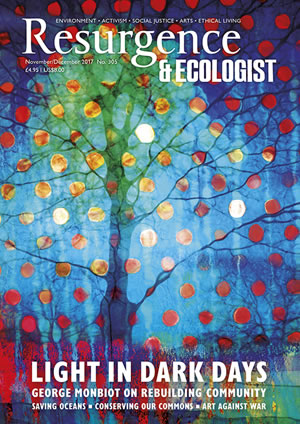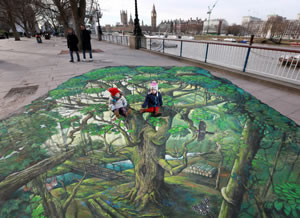Eight hundred years ago, on 6 November 1217, a new version of the Magna Carta was issued along with a new charter – the Charter of the Forest – which set out rights of access for free men to the fields, moorland, woods and trees that made up the royal forest. It was one of the first ecological charters in history. Today, while most people in Britain no longer rely on the woods for jobs like charcoal burning and fuel for cooking, trees remain a vital source of clean air, a flood defence and a home for wildlife.
Now, in a bid to define the different but equally important relationship between people and trees, eight centuries after the Charter of the Forest was issued, the British charity the Woodland Trust is leading over 70 partner organisations in the call for a Charter for Trees, Woods and People. The charter outlines 10 principles that set out how people and trees can benefit each other. These will be applicable to policy, business practice and individual action.
The seed of the idea came about in 2010 when the British government put forward controversial plans to privatise the Forestry Commission before being forced to back down following widespread public opposition. “That was the start of it,” says Sarah Rouse, project officer for the Woodland Trust. “It showed the connection between communities and local woods and the importance of ownership.”
The principles, written up by experts from the organisations that are creating the charter, were informed by over 60,000 tree stories submitted by the public as part of the trust’s campaign. These ranged from appreciation of being a “cog in the great cycle of Nature” to childhood memories of a lilac tree.
People are being encouraged to sign the charter to show their support. As this issue of Resurgence & Ecologist went to press, more than 86,000 had added their names.
The Tree Charter will initially be used as a tool backed up by the evidence of the stories about what the public wants from their trees and woods, says Rouse. “We are not engaging politicians or the government yet,” she explains, but this will change as the project grows. The launch, on 6 November, will be accompanied by art exhibitions, a Tree Trail and other events.
As discussions abound on the potential of trees in helping prevent flooding and air pollution and the growing disconnect between our children and Nature, Beccy Speight, chief executive of the Woodland Trust, said: “It feels as though there has never been a better time to reawaken our consciousness and re-articulate the fundamental age-old beneficial connections between trees and people.”
THE TREE CHARTER PRINCIPLES
Thriving habitats for diverse species
Planting for the future
Celebrating the cultural impact of trees
A thriving forestry sector that delivers for the UK
Better protection for important trees and woods
Enhancing new developments with trees
Understanding and using the natural health benefits of trees
Access to trees for everyone
Addressing threats to woods and trees through good management
Strengthening landscapes with woods and trees
SILENT WITNESSES
Published to coincide with the Charter for Trees, a new book by Christiana Payne, Silent Witnesses: Trees in British Art 1760–1870, explores the role of trees in British art at a time when woods were revered as cool escapes from the city, and drawing manuals presented the anatomy of the tree as though it were a human form.
TREE PROTEST GOES ON
Opposition continues against a plan by Sheffield council in South Yorkshire to cut down hundreds of trees as part of a highway maintenance scheme (Frontline, Issue 301). After a high court injunction prevented them from standing under trees marked for felling, protesters blockaded a council depot to stop contractors leaving to fell the trees. Support also appeared in the form of Michael Gove, Britain’s Environment Secretary, who wrote a letter to the council demanding an end to the plan. Despite this, the fellings continue.
CONFERENCE CALL
Botanist Diana Beresford-Kroeger and explorer Bruce Parry are among those due to take part in The Tree Conference in Glastonbury, Somerset on 4 November to discuss the role of trees in mitigating climate change and ocean acidification. With UK forest cover currently at just 12%, one of the lowest rates in Europe, the conference will shed light on the threats trees face in Britain and contribute to the wider global conservation movement, organiser Sue Martineau said. A two-week Tree Art Exhibition will take place either side of the event.







